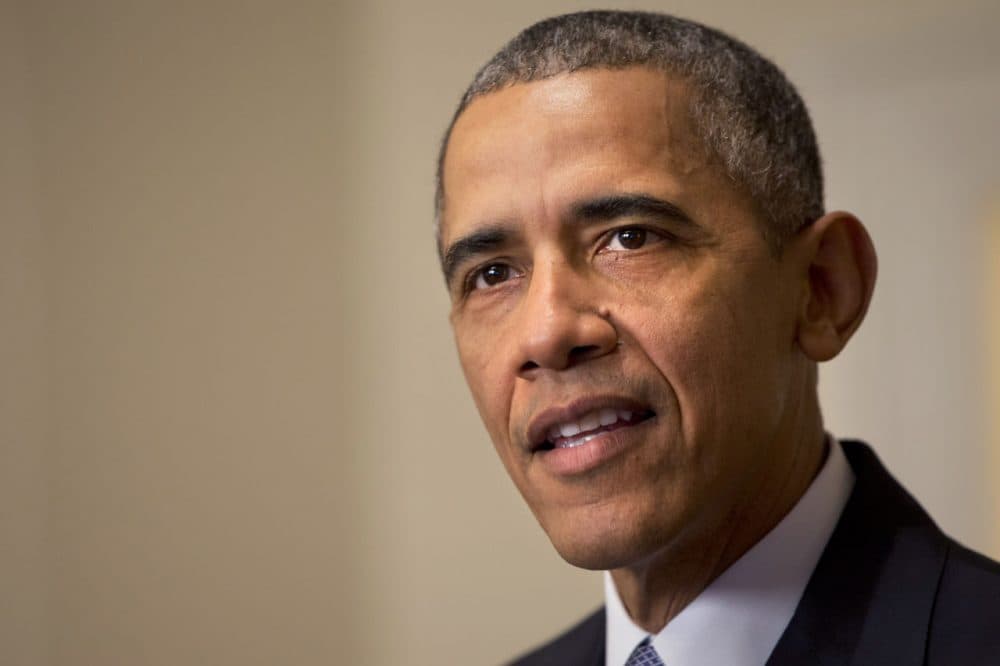Advertisement
Losers Win? Runners-Up Live Longer Than Presidents, Harvard Study Finds

The gray that has seeped across his hair, the skin folds that now bracket his mouth — like many leaders, President Obama has aged dramatically while in office.
And that visible aging may reflect stress-driven biological wear-and-tear that could shorten a leader's life, suggests a new study on presidents and prime ministers.
The findings contradict an alternative school of thought, that the elixir of winning and holding power leads to longer life.
From the BMJ press release:
Election to head of government is associated with an increased risk of death compared with runner-up candidates, finds a study in the Christmas issue of The BMJ.
...A team of US researchers set out to test the theory that politicians elected to head of government may experience accelerated aging and premature death due to stress of leadership and political life.
They compared survival of 279 nationally elected leaders from 17 countries with 261 unelected candidates who never served in office, from 1722 to 2015...
After adjusting for life expectancy at time of last election, elected leaders lived 2.7 fewer years and had a 23% increased risk of death than runners-up.
WBUR's Rachel Paiste spoke with Harvard Medical School's Anupam Jena, an associate professor of health care policy and senior author on the paper. Their conversation, lightly edited:
RP: What did you find?
AJ: What we looked at was the question of whether or not presidents and prime ministers accelerate in their aging as a result of the stress of governing a nation. There's a lot of anecdotal evidence about how Presidents Obama and Clinton have grayed — and of course, President Clinton had a coronary artery bypass graft surgery several years ago but is doing quite well.
But the question remains whether the stress of politics does lead presidents to die earlier than they would otherwise.
In an analysis of 17 countries, we looked at those elected to head of state versus runner-up candidates. What we found was that in that comparison, those elected to office lived about 2-1/2 fewer years from the time of election. And the key is you don't want to compare presidents or prime ministers to the overall population, because they obviously get much different medical care. They get world-class medical care. So you would expect, if anything, that they would do better. So you have to find the right comparison population that has the same socioeconomic status and access to health care, and our view was that runner-up candidates met that criteria.
"The takeaway is that the stress of politics is real."
Harvard's Anupam Jena
Did you look at heart problems and stress issues, or just at when people died?
We just looked at when people died, because the detailed medical records of these individuals is actually almost impossible to obtain unless it's given to you.
What's the takeaway?
I think the takeaway is that the stress of politics is real. These individuals make critical decisions on a regular basis; they're in the spotlight, there's the stress of political rivalries on top of that. And the biggest thing is that the decisions that have to be made are massive in nature. My suspicion is that it's the stress of politics that induces accelerated aging. But these are also extraordinarily busy people. In general, there's less time to exercise, less time to eat healthy — so it could be the stress, or the busyness of life, but both of those things could have that effect on mortality.
Did you expect this outcome?
We were a little bit surprised. There was a really interesting study published a few years ago that didn't find an effect, but it was only based in the United States and it compared presidents to the general population, as opposed to people who would be of similar socioeconomic status.
So we were a little bit surprised because that study didn't find anything. But that being said, in photos of presidents and prime ministers, you see them clearly aging. And we do know photos are predictive of adverse health outcomes later in life. So in that sense, I guess we shouldn't have been surprised.
So in a sense, losers dodge a bullet?
Right, no pun intended...
Further reading: Though this study suggests runners-up live longer than winners, another report just out in the BMJ finds that on average, British members of parliament live much longer than the general population (especially lords).
Update at 6 p.m.: We received a good question on the WBUR Facebook page, wondering if the researchers controlled for assassinations. So Rachel went back to Jena, who emailed:
Our primary analysis didn’t control for assassinations because we considered that a health risk of the job (just like for a police officer, fireman, etc.). But assassinations are so uncommon that when we exclude them it doesn’t have any impact on our results. I think including them is the conceptually right thing to do but doesn’t matter either way it turns out.
This article was originally published on December 15, 2015.
